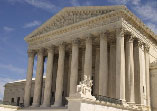| Brocade Communications Systems, seeking to recoup losses from the company's stock-option scandal, has decided to pursue racketeering claims against 10 former executives and directors of the company, including former Chief Executive Gregory Reyes, now in prison for his role in the backdating. However, in court filings released Monday, the company announced it did not plan to pursue claims against Silicon Valley über-lawyer Larry Sonsini and his firm, Wilson Sonsini Goodrich & Rosati. Brocade's special litigation committee emphasized that Sonsini, who had played controversial dual roles at Brocade as both its corporate counsel and as a board member, and his firm had maintained that they had been misled by Reyes. The filings revealed that another reason was a $9.5 million "contribution" from Wilson Sonsini to defray legal expenses related to the scandal. "These guys did a very thorough investigation and found it would be inappropriate to pursue a claim against the firm or any one of its lawyers," said Wilson Sonsini spokeswoman Courtney Dorman. In its 307-page filing, the litigation committee said it would assert claims against the defendants under the Racketeer Influenced and Corrupt Organizations Act, known as RICO, for violations of federal law. The new Brocade suit also targets Stephanie Jensen, Brocade's former vice president of human resources, who was also convicted of federal crimes. It also names five other former executives and three directors on Brocade's audit committee: Neal Dempsey, Mark Leslie and Seth D. Neiman.
Reyes' attorney Richard Marmaro said it is "sad" that the Brocade committee "has chosen to denigrate the accomplishments of so many past and present employees by recklessly suggesting that at the height of its success, Brocade was used as a racketeering enterprise." Brocade was among the first companies to come under suspicion for secretly manipulating stock options to benefit insiders, foreshadowing a national scandal that raised suspicions at more than 200 firms. The scandal prompted criminal charges, the ousters of scores of executives and billions of dollars worth of financial restatements. |





